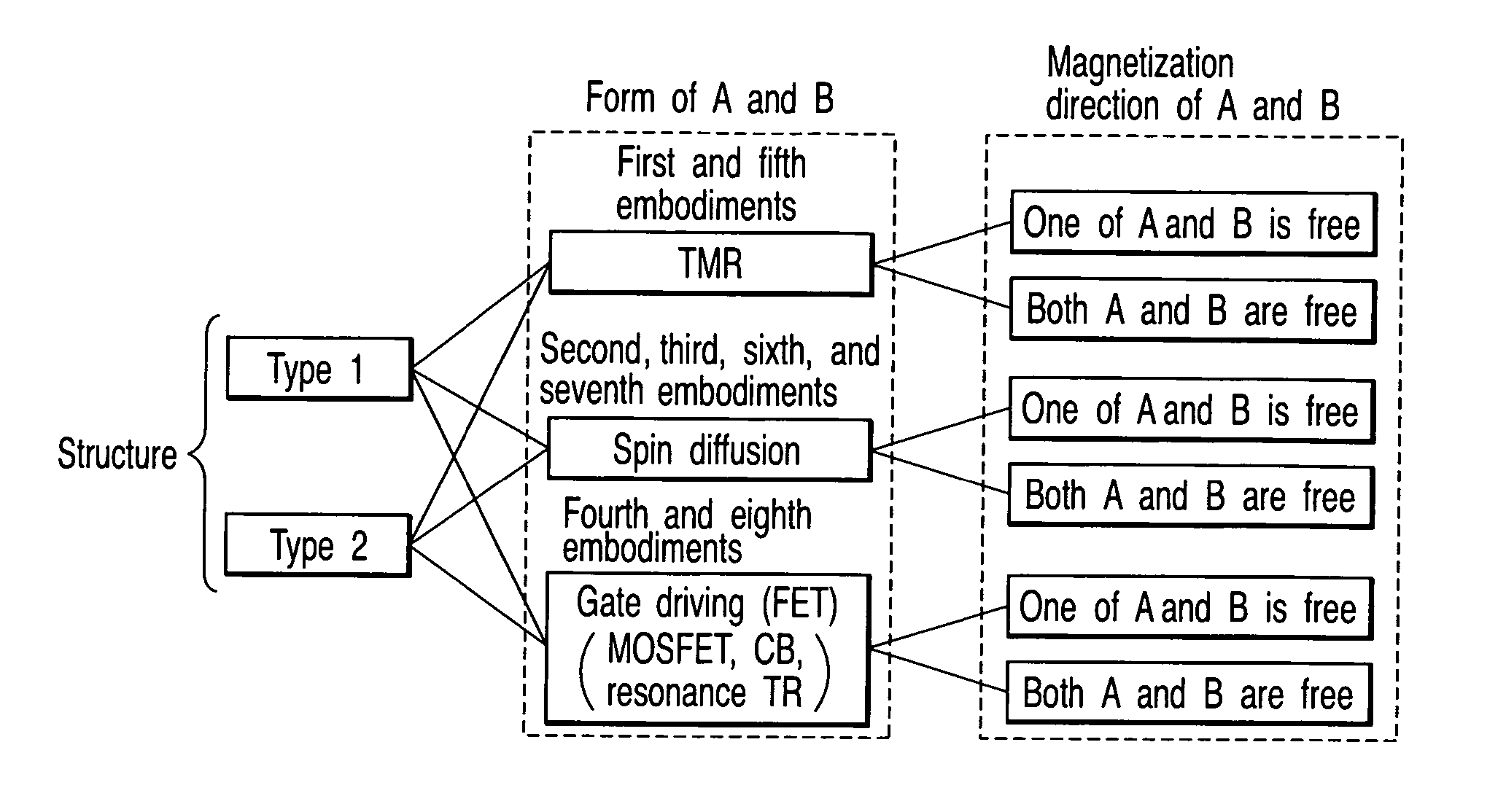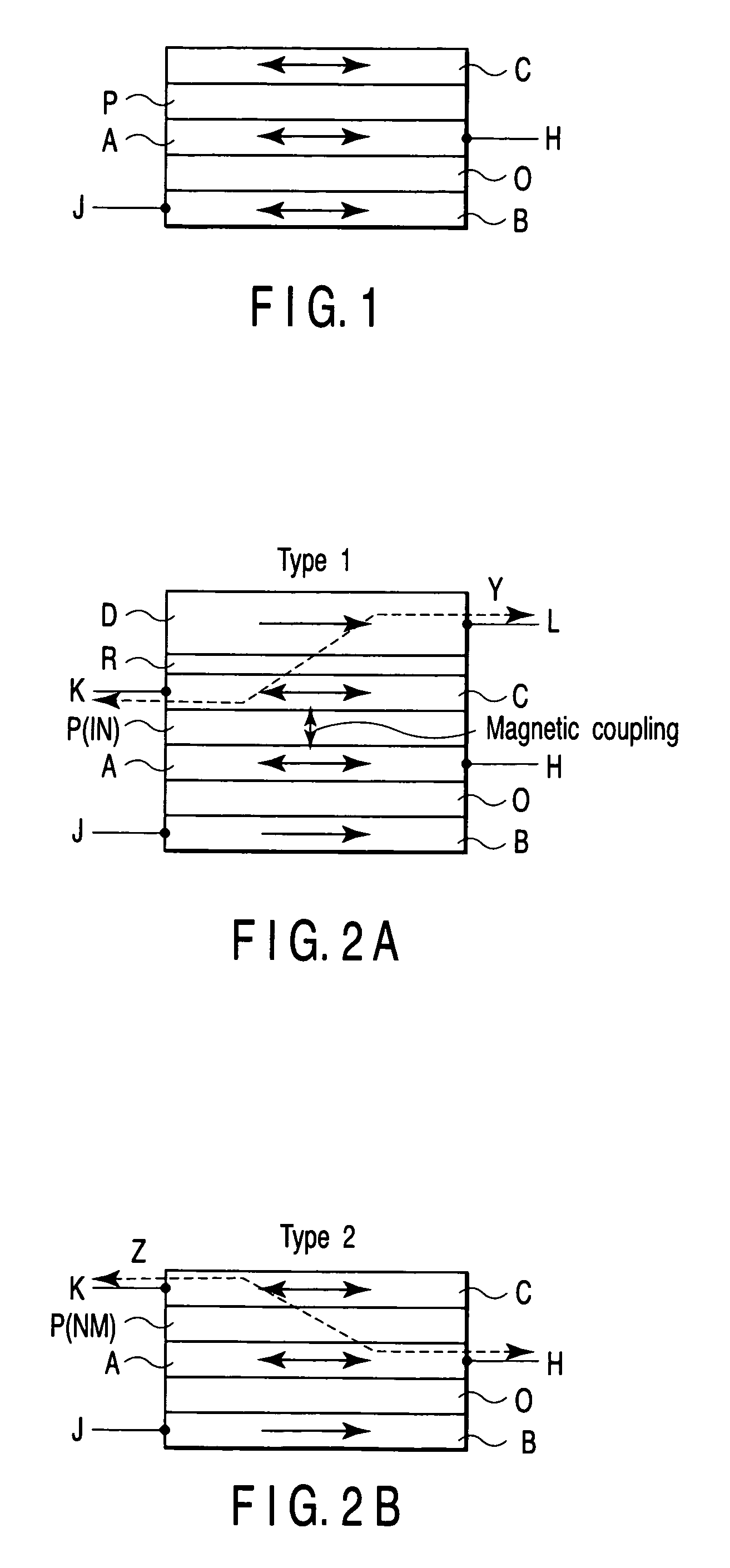Magnetic element
a technology of magnetic elements and elements, applied in the field of magnetic elements, can solve the problems of high required power, easy crosstalk, and high required power, and achieve the effects of reducing the size of the element and power saving, and avoiding crosstalk
- Summary
- Abstract
- Description
- Claims
- Application Information
AI Technical Summary
Benefits of technology
Problems solved by technology
Method used
Image
Examples
first embodiment
[5] First Embodiment
[0101] In the first embodiment, an example of a TMR magnetic element of type 1 will be described.
[5-1] Structure
[0102]FIGS. 15A to 15H are schematic views showing a magnetic element according to the first embodiment of the present invention. The structure of the magnetic element according to the first embodiment of the present invention will be described below.
[0103] As shown in FIG. 15A, the magnetic element according to the first embodiment comprises a channel layer O including a tunnel barrier layer TB, magnetic electrodes A and B which sandwich the channel layer O, a magnetic layer C provided on the side of the magnetic electrode A, a nonmagnetic or magnetic insulating layer IN (intermediate layer P) provided between the magnetic layer C and the magnetic electrode A, a magnetic layer D provided on a side of the magnetic layer C opposite to the magnetic electrode A, an intermediate layer R made of a metal or insulator and provided between the magnetic laye...
second embodiment
[6] Second Embodiment
[0156] In the second embodiment, an example of a spin diffusion magnetic element of type 1 will be described. In the second embodiment, voltage generation by the spin diffusion effect is used as a means for obtaining the output signal between magnetic electrodes A and B.
[6-1] Structure
[0157]FIGS. 16A to 16D are schematic views showing a magnetic element according to the second embodiment of the present invention. The structure of the magnetic element according to the second embodiment of the present invention will be described below.
[0158] As shown in FIG. 16A, the magnetic element of the second embodiment is largely different from that of the first embodiment in that a metal layer is used as a channel layer O, and electrodes I1 and I2 are connected to the channel layer O.
[0159] More specifically, the magnetic electrodes A and B are provided in contact with the channel layer O made of a metal. The magnetic electrodes A and B are arranged adjacent on the sam...
third embodiment
[7] Third Embodiment
[0175] In the third embodiment, an example of a spin diffusion magnetic element of type 1 will be described, as in the second embodiment. In the third embodiment, a compound layer is provided.
[7-1] Structure
[0176]FIGS. 17A to 17D are schematic views showing a magnetic element according to the third embodiment of the present invention. The structure of the magnetic element according to the third embodiment of the present invention will be described below.
[0177] As shown in FIG. 17A, the magnetic element of the third embodiment is largely different from that of the second embodiment in that a compound layer Q is provided between a channel layer O and magnetic electrodes A and B.
[0178] More specifically, the compound layer Q containing at least one of oxygen, nitrogen, and fluorine is provided in contact with the channel layer O made of a metal. The magnetic electrodes A and B are provided in contact with the compound layer Q. The magnetic electrodes A and B ar...
PUM
| Property | Measurement | Unit |
|---|---|---|
| thickness | aaaaa | aaaaa |
| thickness | aaaaa | aaaaa |
| size | aaaaa | aaaaa |
Abstract
Description
Claims
Application Information
 Login to View More
Login to View More - R&D
- Intellectual Property
- Life Sciences
- Materials
- Tech Scout
- Unparalleled Data Quality
- Higher Quality Content
- 60% Fewer Hallucinations
Browse by: Latest US Patents, China's latest patents, Technical Efficacy Thesaurus, Application Domain, Technology Topic, Popular Technical Reports.
© 2025 PatSnap. All rights reserved.Legal|Privacy policy|Modern Slavery Act Transparency Statement|Sitemap|About US| Contact US: help@patsnap.com



